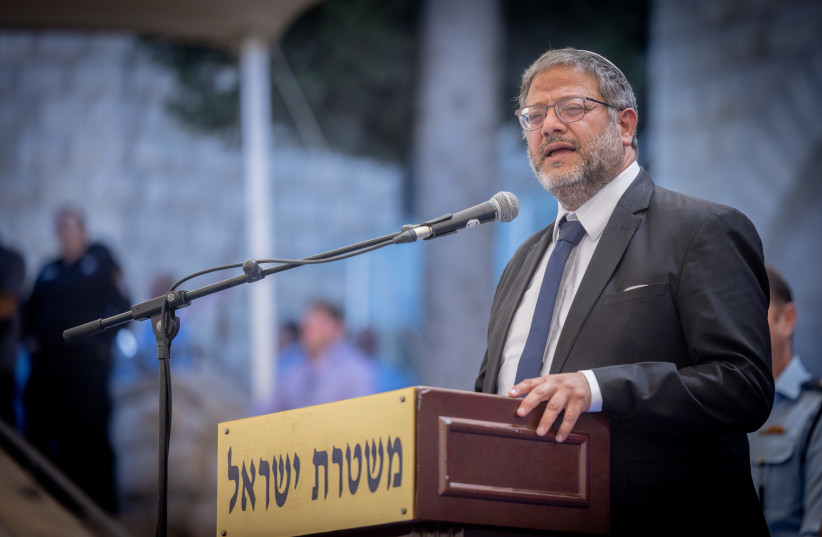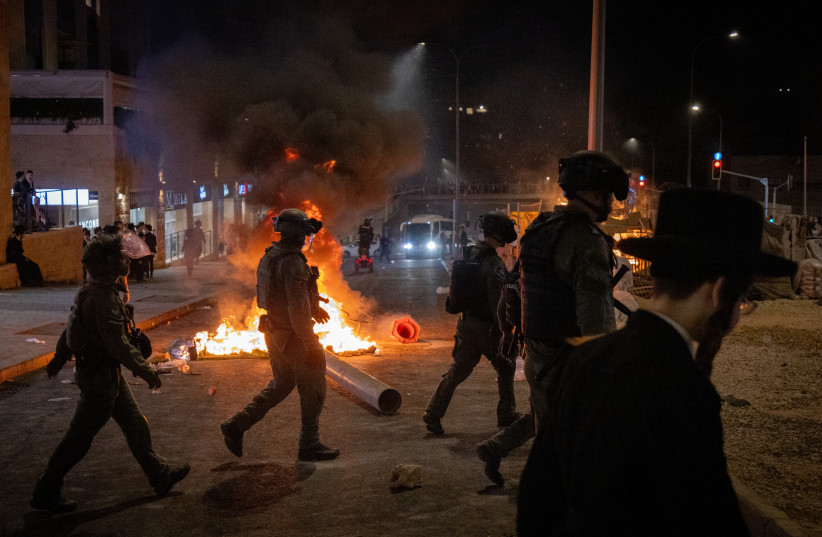The Police Investigation Department (PID) instructed the Israel Police’s discipline department to take action against an officer who pushed MK Gilad Kariv at a protest in Tel Aviv in February.
Evidence shows that the officer had no authority to use force against the MK, the department said, ordering that the officer face disciplinary consequences.
“I can’t help but wonder how for four and a half months, I have continued to see this violent officer at protests,” said Kariv.
Kariv welcomed the verdict but questioned not only how the officer could have continued to work at protests but also why it took the PID nearly five months to respond in a case with so much video evidence.
Police violence has been getting worse in recent months, said Kariv, adding that this is not only the direct result of the spirit promoted by National Security Minister Itamar Ben-Gvir but also because of the laxity of the PID and other disciplinary mechanisms.

Worsening police violence
A video of the incident that led to Kariv’s complaint shows an officer pushing Kariv while yelling at the MK, “Don’t push me.”
On Tuesday, Kariv, along with MK Naama Lazimi, launched a meeting of the Caucus to Combat Police Violence which also seeks to fight politicization of the Israel Police.

Kariv, Lazimi, and multiple participants attributed this political behavior to the atmosphere created by Ben-Gvir.
Part of the problem is a lack of enforcement against officers, which leaves them feeling that they can get away with anything, said multiple caucus participants. Many pointed out that the PID and other oversight mechanisms are not effective in their enforcement. Participants shared examples of cases where the PID had closed cases or failed to provide answers regarding those cases.
Seeing that their colleagues are involved in violence against protesters without suffering consequences encourages other officers to act violently, said one representative.
Dr. Ilan Samish told the caucus that only seven of the 1,602 arrests of protesters resulted in indictments, demonstrating that the police are using the arrests as an enforcement tool rather than when a crime has occurred.
The Legal Assistance for Protesters organization echoed this sentiment, arguing that police use arrests as a punishment tool, a practice that falls far outside the scope of their duties. Deciding on the punishment for a crime is the responsibility of the courts, whose role it is to determine whether a crime has been committed and what the consequences should be, the organization said.
At the caucus meeting, Gonen Ben Itzhak, who represents the legal aid organization, pointed to another form of police violence at protests. The police allow groups of people to gather near the demonstrations and harass and threaten the protesters, he said.
The Israel Police spokesperson is also a participant in police violence when it puts out false statements about incidents, claimed Lazimi, who said that without documentation of incidents showing otherwise, many innocent people would have been accused of attacking police officers.
In some cases, the spokesperson retracts these statements when contradictory footage is revealed; in others, it does not, she added.
When a law-abiding person is slapped or hit by police, it results in a complete loss of faith in the system, said Shahar Mor, whose uncle, Avraham Munder, is being held hostage by Hamas. Mor was seriously injured when a police officer threw a stun grenade during protests against the judicial overhaul in March of last year.
Even though the PID investigation into Mor’s case took two months, he is still waiting for the results more than a year later, while the officer who threw the grenade has continued to work normally and received a promotion.
No Israel Police representative was present at Tuesday's caucus, but in a Knesset Committee meeting just over a month ago in which similar criticisms of police behavior were raised, Israel Police reaffirmed its commitment to protecting the right of citizens to protest, within the bounds of the law.
“Freedom of expression ends where criminal offense begins,” said the police representative at the meeting, before stressing that police will defend the right of protest until criminal offenses are committed. He also said that there are oversight mechanisms to check illegal behavior by police.
“Police are not always perfect. If there are mistakes, they should be examined,” he said. Police are doing the maximum, but “you must understand that this is a very complex task,” he told the committee.
